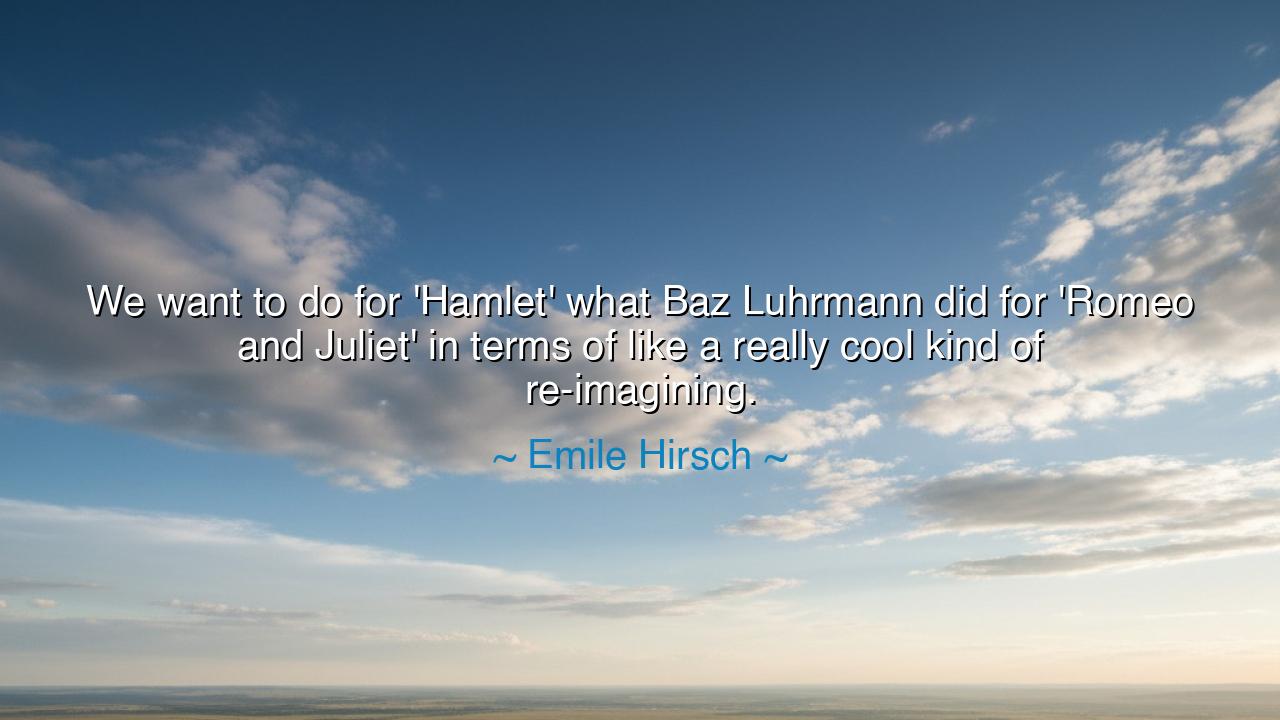
We want to do for 'Hamlet' what Baz Luhrmann did for 'Romeo and
We want to do for 'Hamlet' what Baz Luhrmann did for 'Romeo and Juliet' in terms of like a really cool kind of re-imagining.






Emile Hirsch’s desire to “do for 'Hamlet' what Baz Luhrmann did for 'Romeo and Juliet' in terms of a cool re-imagining speaks to a timeless truth: that the power of art lies not only in the stories themselves, but in how they are reinterpreted and brought to life for new generations. To reimagine the classics is to breathe new life into them, to take the ancient and make it relevant to the world we live in today. Shakespeare’s works, though centuries old, possess a profound universality—they speak to the human condition, and by giving them a modern twist, we renew their relevance and timelessness.
The ancient world itself was no stranger to reinterpretation. The Greeks, for instance, frequently adapted and retold stories from their mythology, not simply to preserve them, but to make them resonate with the needs and concerns of each generation. Sophocles, in his reimagining of earlier myths, brought new perspectives to age-old stories. The Oedipus myth, for instance, had been told in various forms long before Sophocles’ version, yet his interpretation remains one of the most powerful because of his focus on fate, self-discovery, and the consequences of human actions—elements that remain deeply relevant today. In the same way, Luhrmann’s version of 'Romeo and Juliet' found new expression in a modern world while keeping the heart of the original passion and tragedy.
In the story of Alexander the Great, we see a similar desire to reshape the world around him. Though born into a world of ancient kingdoms, Alexander sought not merely to conquer, but to transform. His approach to leadership and conquest was marked by a blending of old traditions with new ideas. Just as Emile Hirsch hopes to revitalize 'Hamlet', Alexander infused his empire with a mix of Greek thought and Persian culture, bringing together different worlds to create something greater. His success was not just in his military triumphs, but in his ability to reimagine the world he inherited, creating a legacy that would endure far beyond his death.
Baz Luhrmann’s vision for 'Romeo and Juliet' was revolutionary because it dared to juxtapose Shakespeare’s poetic language with the fast-paced, visually stunning world of modernity. By placing the timeless tragedy in a contemporary setting, with cars, guns, and neon lights, Luhrmann revealed that love, conflict, and fate are as relevant to the modern world as they were to the world of Verona. The same themes that Shakespeare explored centuries ago can still resonate deeply today, and Luhrmann’s film proved that the classics need not remain locked in the past. This is precisely the vision that Hirsch seeks to carry forward with 'Hamlet'—not to strip it of its grandeur, but to make it vibrant, dynamic, and deeply connected to our present-day concerns.
What we see in these efforts to reimagine classic works is a powerful lesson about the fluidity of time and the enduring power of art. Just as Socrates believed in the eternal search for wisdom, transcending the ages through philosophical discourse, so too does art transcend time when it is allowed to evolve. Art, whether in the form of theater, literature, or film, has the ability to cross the boundaries of history, to remain alive in each new generation by being reinterpreted and reimagined. The classics are not relics to be preserved, but living, breathing works that can continue to teach us, challenge us, and inspire us.
The lesson here is clear: we must not be afraid to reinvent and reimagine the legacies of the past. Whether in art, philosophy, or our own lives, the act of reinvention is one of the greatest gifts we can give to the future. While we must honor the wisdom of the ancients, we also must recognize that our world is constantly changing, and the stories that have shaped us need to evolve to reflect those changes. We are the custodians of both the past and the future, and our challenge is to ensure that the teachings of the ancients continue to resonate, not by simply repeating them, but by reshaping them for our time. Just as Emile Hirsch looks to reimagine 'Hamlet', let us each find ways to reimagine the legacies we inherit, infusing them with our own unique vision and energy, ensuring that they remain relevant for those who will follow us.






AAdministratorAdministrator
Welcome, honored guests. Please leave a comment, we will respond soon